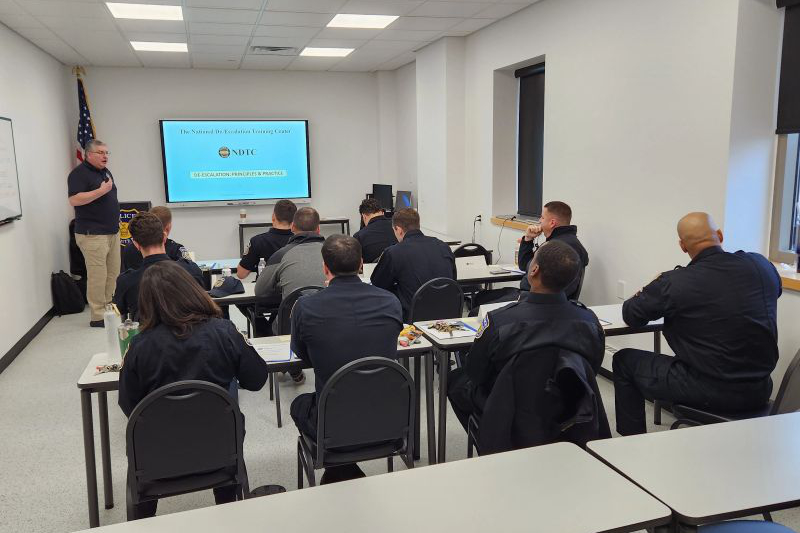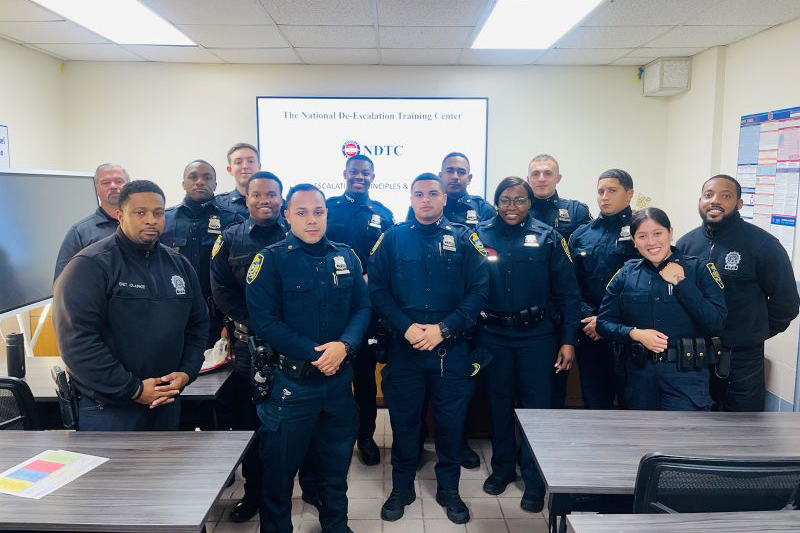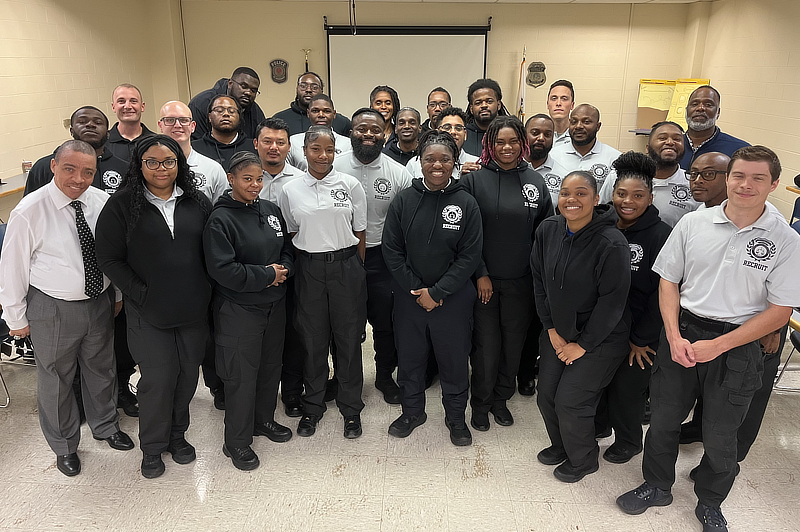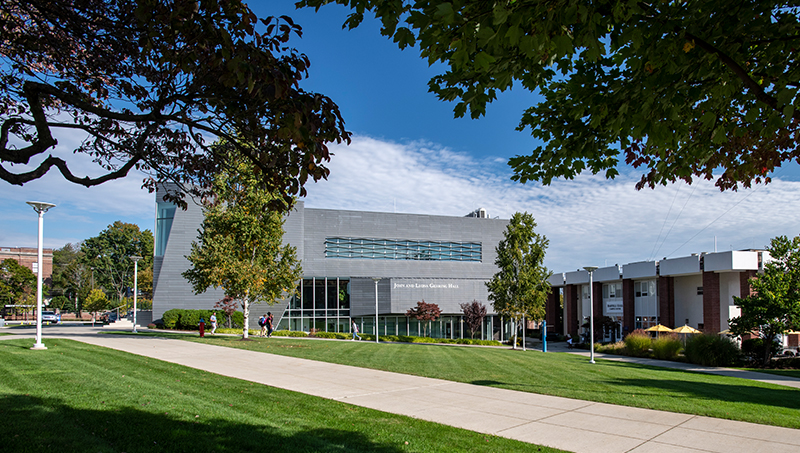Dec. 10-11
8 a.m. - 4 p.m.
University of Pittsburgh Police Department, David Lawrence Hall,
3942 Forbes Ave., Pittsburgh, PA

This federally funded program will promote de-escalation tactics within law enforcement and public safety. The primary goal is to deliver the most advanced de-escalation training curated by research, innovation, and implementation of best practices. This project was made possible with a grant from the United States Department of Justice, Community Orientated Policing Services (COPS) Office to the University of New Haven, COPS Award Number: 15JCOPS-24-GK-04180-DETX.
Read the following article from Applied Police Briefings, studying the effectiveness of police de-escalation trainings:
Can De-escalation Training Reduce Use of Force and Injuries to Citizens Without Risking Officer Safety? (PDF)
To read more resources and articles covering the research supporting de-escalation related topics, visit the National De-escalation Training Center library:
https://ndtccenter.com/ndtc-library
These free, two-day training programs will deliver best practices in de-escalation including procedural justice, correct de-escalation language, adjustments for varying threat stages and environments, body language, conflict management, recognizing mental health and disability issues and means to adjust interactions based upon rapid personality identification.
This training is approved for POST credit in the state of Connecticut and CLEE credit in the state of Pennsylvania.

Dec. 10-11
8 a.m. - 4 p.m.
University of Pittsburgh Police Department, David Lawrence Hall,
3942 Forbes Ave., Pittsburgh, PA
Jan. 12-13
8 a.m. - 4 p.m.
New Hanover County Sheriff’s Office,
3950 Juvenile Center Rd., Castle Hayne, NC
Jan. 12-13
8:45 a.m. - 5 p.m.
Massachusetts Parole Board, Central Office Traning Room
12 Mercer Rd., Natick, MA
Jan. 12-13
8:30 a.m. - 4:30 p.m.
25 Science Park, Public Safety Training Center Room 503
150 Munson St., New Haven, CT.
Host agency: Yale Public Safety
Jan. 14-15
8 a.m. - 4 p.m.
New Hanover County Sheriff’s Office,
3950 Juvenile Center Rd., Castle Hayne, NC
Jan. 14-15
8:45 a.m. - 5 p.m.
Massachusetts Parole Board, Central Office Traning Room
12 Mercer Rd., Natick, MA
Jan. 15-16
8:30 a.m. - 4:30 p.m.
25 Science Park, Public Safety Training Center Room 503
150 Munson St., New Haven, CT.
Host agency: Yale Public Safety
Jan. 22-23
8 a.m. - 4 p.m.
Justice System Training & Research Institute at Roger Williams University
1 Empire St, Providence, RI
Feb. 9-10
8 a.m. - 4 p.m.
UNC Greensboro Police Department,
1200 W. Gate City Blvd. Greensboro, NC
Feb. 9-10
8:45 a.m. - 5 p.m.
Massachusetts Parole Board, Central Office Traning Room
12 Mercer Rd., Natick, MA
Feb. 11-12
8:45 a.m. - 5 p.m.
Massachusetts Parole Board, Central Office Traning Room
12 Mercer Rd., Natick, MA
Feb. 16-17
8 a.m. - 4 p.m.
UNC Greensboro Police Department,
1200 W. Gate City Blvd. Greensboro, NC
Feb. 19-20
8 a.m. - 4 p.m.
Justice System Training & Research Institute at Roger Williams University
1 Empire St, Providence, RI
Feb. 23-27
8 a.m. - 4 p.m.
Wor-Wic Community College,
32000 Campus Drive, Salisbury, MD
Host Agency: Eastern Shore Criminal Justice Academy
March 30-31
8 a.m. - 4 p.m.
Justice System Training & Research Institute at Roger Williams University
1 Empire St, Providence, RI
Once this free, one-week training program is successfully completed, you would provide training to other applicable agencies and organizations and become a trainer for the Eastern Region De-escalation Training Center, as needed.
This training is approved for POST credit in the state of Connecticut.
Feb. 9-13
8:30 a.m. - 4:30 p.m.
25 Science Park, Public Safety Training Center Room 503
150 Munson Street, New Haven, CT
Host agency: Yale Public Safety

The Center for Advanced Policing is also holding training sessions through the Connecticut State Police Officer Standards and Training (POST) Council. These courses are offered for Connecticut certified police officers only, and all requests for course registration must be made by the authorized representative of the police agency and not the individual officer. These trainings will be held at the CT Police Academy, 285 Preston Ave., Meriden.
For registration info, and a full list of In-Service Training Courses:
https://portal.ct.gov/POST/Field-Services-Training-Courses/In-Service-Training-Courses
The Center for Advanced Policing is proud to announce a partnership with the North Carolina Justice Academy, which will become a training hub for de-escalation training sessions. Interested individuals are required to register for trainings by visiting https://ncja.ncdoj.gov/. If you have any questions about the NCJA registration process, please contact Dan Grossi at dgrossi@ncdoj.gov. Any officer from outside the state of North Carolina who is interested in attending a de-escalation training session in North Carolina is asked to personally contact Dan Grossi to register.
Police officers are often the first to encounter individuals in crisis, making it crucial to equip them with the right knowledge and tools to respond safely and effectively. This four-hour, online, self-paced course is designed to give you practical strategies to manage challenges posed by the opioid crisis and handle interactions with individuals affected by Opioid Use Disorder (OUD) and co-occurring Substance Use Disorders (SUD) or Mental Health (MH) conditions. Learn to de-escalate crises, connect individuals to needed resources, and minimize risks to both you and the community.
This course is designed to prepare law enforcement officers to effectively handle crises involving OUD and related mental health conditions. With the opioid epidemic posing significant challenges for public safety, officers need the tools to respond with empathy, safety, and precision. Through four comprehensive modules, this course covers the complexities of OUD, including the use of Naloxone, the impact of co-occurring mental health disorders, legal considerations, and best practices for de-escalation. The goal is to equip officers with practical strategies to manage these crises safely, while building trust with individuals in need.
Ultimately, this course is aimed at improving officer-community relations by fostering trust and reducing the stigma around addiction. By focusing on harm reduction and non-punitive approaches, officers will be better positioned to support individuals with OUD, reduce the risk of escalation, and strengthen community ties through compassionate, effective interventions.
For more information, please click on the link below:
Operational Readiness Program"I had the opportunity to attend the two-day De-Escalation Training at the NCPD Training Center. I found this training to be extremely informative and will be useful in daily life, while at work, with family, or others. It encompassed the DISC System which helps to understand four behavioral styles to assist in becoming better communicators, minimize or prevent conflict, appreciate differences in others, and positively influence those around you. I particularly learned about my own style and how this can be useful in achieving specific outcomes."
"The training was very productive and will be very effective and helpful in our line of work - law enforcement. It is imperative to attend this training as we often are met with clients who can be aggressive, are criminally minded, under the influence of substances, or exhibit mental health concerns. It emphasizes the Use of Force Continuum and underscores the need to De-escalate a situation before implementing any type of force. The trainers were extremely knowledgeable and experienced in the field of law enforcement and presented the material in a thorough manner with plenty of visual handouts, videos, and group participation. Thank you for offering this training to the Probation Department."
- Supervisor/Probation Officer in the state of New York
"I wanted to take a moment to thank you for recommending the NDTC Train the Trainer course in Springfield, Mass., last week. Despite the long drive from Rochester, NY on Monday morning, I thoroughly enjoyed the training. Because of our previous conversation about the significance of this course piqued my interest and I was eager to learn more. Upon arriving at the training on Monday, I was greeted by our instructors, Joe Arianna and Jeff Scholz, who were both incredibly knowledgeable.
As the training began, I was immediately drawn in and felt like a whole new world was opening up to me. I was particularly fascinated by the disc assessment, Esoteric matrix, and trauma-informed policing, which confirmed many of my thoughts and ideas about modern policing. I am grateful for the training program that you have offered, as it provides valuable knowledge and skills to law enforcement professionals like myself. In my 38 years of experience, I have seen the importance of adapting to the constantly evolving concepts and techniques that improve the relationship between police and diverse communities. The use of community policing and strategic partnerships has been proven to build trust and legitimacy in the eyes of the public. Additionally, incorporating a trauma-informed approach in policing is crucial for the well-being of both officers and the communities they serve. I highly commend the class and instructor for their exceptional work, and I am eager to continue working with you and the NDTC team in advancing this important work."
- Feedback shared from an officer who attended a de-escalation training
"Lisa, Thanks for the two-day Principles and Practice de-escalation training you assigned to Smith College. The presenters. Dr. Lorenzo Boyd and Sgt. Martin Dadio (Retired New Haven) were exceptional in their presentation, shared experience, and teaching impact. The training provided was some of the finest, most pertinent, and most impactful information I have experienced over my 42 years of public service. My officers and the other officers who attended expressed the same sentiments. I highly recommend this training to all police departments across the country."
- James "Jimi" Nealy, Chief of Public Safety at Smith College, after attending a recent session. Jimi Nealy Jr. has over 42 years of law enforcement experience. He has worked in corrections and is retired from the Connecticut State Police. Jimi was the director/supervisor of the K–12 School Police and Security Unit and the assistant chief for the public safety departments at two of Connecticut’s universities.
"On behalf of St. Thomas Aquinas College, I want to thank you for an outstanding week of training for my staff, as well as several representatives from a variety of local law enforcement agencies.
Your staff was excellent and spot-on in presenting a necessary component to interacting with students and the public at large. Thank you very much for your efforts, professionalism, and sharing your expertise. I look forward to continued collaboration in the future. Be well, stay safe, and keep up the outstanding work!"
- Michael Greco, Director of Campus Safety, St. Thomas Aquinas College, Sparkill, NY.
"Dear Lisa, Thank You for sending Laura, Elliott, and Justin to teach the NDTC Principles and Practice Class this week. These instructors were phenomenal and worked very well as a team. They all connected with my students and were able to make tremendous progress to get this done. I am very grateful to you, and to these professional instructors for their time, their talents, and their diligence and willingness to teach this class and enlighten my students with this knowledge to help them become better officers in Washington D.C. Our first CPSI Academy class in 2025, will begin in Feb.ruary, and I am anticipating inviting this team to conduct this training for us either at the end of March, or early April. I look forward to hearing from you soon and continuing our partnership to better equip police officers with this knowledge, and skill going forward."
- Leroy "Lee" James, Director of Public Safety Programs, Consortium of Universities of the Washington Metropolitan Area
"I would like to note that I very much enjoyed the training - which, for me, is unusual. Police trainings are often repetitive information, only communicated in a different way. The instructors in this training also made all the difference; they were excellent."
- Past attendee; 35-years of experience in law enforcement

"Dear Trainers,
I would like to sincerely thank you all for the incredible training experience. My staff thoroughly enjoyed every aspect of it and gained valuable insights, both professionally and personally.
Throughout the sessions, they learned new and effective ways to handle various situations in the workplace, especially when working with individuals (children or adults) with or without disabilities. The strategies you shared for remaining calm and composed in the face of negativity were particularly impactful, and some of them are already starting to apply those techniques.
My staff are all in agreement that one of the most eye-opening parts of the training was the DISC assessment. It helped them better understand their own behaviors and how to interact with others. They were very surprised that their personal DISC assessments were so accurate!
They all agree that the instructors in each class were outstanding, I received really good feedback on how knowledgeable and engaging each instructor was. They all felt like the teams made it easy to participate and made them want to learn more. I am also told that the segment on substance abuse was very helpful, especially the information about vaping. It really stood out to some of the staff members who are also parents. They found it so meaningful that some went home and shared what they learned with their own children.
The role-playing exercises were also incredibly helpful. They brought the de-escalation techniques and models to life, making them much easier to understand and apply.
All in all, the feedback I received was the most positive feedback I have ever received from any training session. Some officers even recommended that we train some additional staff members like Teachers and Principals because they feel they too could benefit from this training.
Thank you again for your time, knowledge, and dedication. I really appreciate the effort you all put into delivering such an insightful and engaging session. It truly made a lasting impression on my whole team, which is not easy to do.
Lastly, thank you, Lisa and Robin, for organizing and facilitating this training. It was highly valuable and directly supports the important work we do here in school safety."
- Chief Dena Young, Chief of School Safety at the Pittsburgh Public Schools



In the Media
Explore the latest on de-escalation in U.S. policing. See what the research shows, where gaps remain, and how NPI helps agencies turn evidence into safer practices.

In the Media
New data released this fall by the Norwalk Police Department shows that officers used force during arrests more in 2023 than in the two previous years.

In the Media
When David E. Lambert began his law enforcement career more than three decades ago, there was little talk of mental illness or the impact of post-traumatic stress disorder. The powerful and deadly synthetic painkiller fentanyl was not yet the drug of choice. And cellphone filming wasn't a thing.